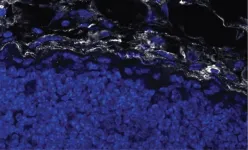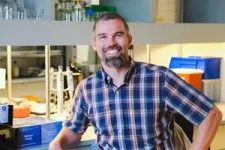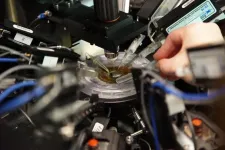(Press-News.org) Immunotherapy is based on harnessing a person’s own immune system to attack cancer cells. However, patients with certain tumors do not respond to these therapies and it remains unclear why.
“The full impact of anti-cancer immunotherapy has not been realized, especially for some solid tumors,” says Kevin Tharp, Ph.D., assistant professor in the Cancer Metabolism and Microenvironment Program at Sanford Burnham Prebys.
Researchers presume that part of the reason why these therapies fail is due to tumor-associated fibrosis, the creation of a thick layer of fibrous collagen (like scar tissue) that acts as a barrier to infiltrating anti-tumor immune cells such as cytotoxic T lymphocytes (CTLs).
In a new paper, published June 3, 2024 in Nature Cancer, first author Tharp and colleagues illuminate how the fibrotic tumor microenvironment creates an inhospitable milieu for anti-tumor immunity.
Kelly Kersten, Ph.D. an assistant professor who is also a member of the Cancer Metabolism and Microenvironment at Sanford Burnham Prebys, is a co-author on the paper. The senior author is Valerie M. Weaver, Ph.D., professor of surgery at University of California San Francisco where the research was primarily conducted.
In the new study, which focused on breast cancer, the authors report that tumor-associated macrophages (TAMs), a type of immune cell found abundantly in the tumor microenvironment, respond to the physical properties of fibrosis by synthesizing injury-associated collagens that facilitate wound closure and “re-epithelialization.”
The resulting metabolic changes in TAMs result in metabolic byproducts that suppress the anti-tumor function of CTLs.
Tharp said the metabolic changes in the microenvironment present more of a challenge to anti-tumor responses than the physical barrier.
“CTLs normally migrate through spaces much smaller than the gaps in collagen networks that form around tumors,” Tharp says. “Our study provides an alternative explanation for why anti-tumor immunity is impaired in fibrotic solid tumors.”
Kersten said the findings underscore that the phenotype and function of immune cells in the context of cancer are heavily regulated by environmental factors, such as tissue stiffness and metabolic challenges.
“Our findings help improve understanding of the mechanisms that regulate anti-tumor immune responses in fibrotic tumors and will aid the development of novel strategies to work in conjunction with immunotherapies to treat cancer patients.”
Additional authors on the study include Ori Maller, Greg A. Timblin, Stashko Connor, Mary-Kate Hayward, Ilona Berestjuk, Bushra Samad and Alexis J. Combes, all at UCSF; Fernando P. Canale and Roger Geiger, Università della Svizzera italiana, Switzerland; Rosa E. Menjivar and Marina Pasca di Magliano, University of Michigan; Johanna ten Hoeve and Alastair J. Ironside, UCLA; and Alexander Muir, University of Chicago.
END
How tumor stiffness alters immune cell behavior to escape destruction
2024-06-04
ELSE PRESS RELEASES FROM THIS DATE:
Convergence and collaboration to achieve circularity
2024-06-04
The linear consumption model of raw material extraction, production, use, and disposal dominates the global economy, but it’s led to serious unintended global consequences: from resource use to pollution including negative impacts on environmental and human health that disproportionately affect the Global South.
In contrast, circular economy – a model where products and materials are by design kept in continual use – aims to decouple economic growth from resource consumption.
While approaches ...
Wayne State University partners with Great Lakes Water Authority to help train water pipeline managers of the future
2024-06-04
DETROIT — The Great Lakes Water Authority (GLWA) has partnered with Wayne State University to develop its Workforce Development and Pipe Management Program, which will help recruit, teach and graduate the next generation of water pipeline managers. The two-year program will begin July 1, 2024, and will be supported by a contract totaling more than $480,000.
The GLWA says that water utilities are experiencing significant employee recruitment, training and retention challenges. An additional concern is the availability of specialized technical training that addresses recent technological advances in the water sector. In response to these challenges, the Workforce Development and ...
NRG Oncology abstract considered “best of ASCO” for 2024 shows difference in outcomes for node-negative versus node-positive pancreatic cancer patients when adding chemoradiation to systemic therapy
2024-06-04
NRG Oncology recently reported the results from the radiotherapy randomization, which was the second step of their NRG-RTOG 0848 clinical study comparing adjuvant chemotherapy with or without chemoradiation for patients with resected periampullary pancreatic adenocarcinoma. The trial data did not show that the addition of radiation and chemotherapy to adjuvant systemic therapy improved overall survival (OS) for all patients on the study, however, OS was improved among node-negative patients. OS was essentially the same between treatment arms for node positive patients. The trial data also showed that disease-free survival (DFS) was improved with ...
Emma Guttman-Yassky, MD, Ph.D., receives high honor at European Academy of Allergy and Clinical Immunology
2024-06-04
Emma Guttman-Yassky, MD, PhD, Receives High Honor at European Academy of Allergy and Clinical Immunology
The Paul Ehrlich Award for Experimental Research recognizes scientists who have revolutionized the understanding of allergic diseases and immunological mechanisms.
New York, NY (June 4, 2024) – The 2024 European Academy of Allergy and Clinical Immunology (EAACI) Annual Congress selected Emma Guttman-Yassky, MD, PhD, Waldman Chair of the Kimberly and Eric J. Waldman Department of Dermatology, and Professor of Dermatology and Immunology, Icahn School of Medicine at Mount Sinai, as the recipient of the ...
An anti-inflammatory curbs spread of fungi causing serious blood infections
2024-06-04
A team of UC Davis Health researchers discovered that a common anti-inflammatory drug, mesalamine, can replace the work of good bacteria in fighting the nasty fungus Candida albicans in the gut.
C. albicans, or candida, is known to cause yeast infections. In some cases, it develops into invasive candidiasis, a potentially fatal infection occurring mostly in patients with compromised immunity.
The researchers found that this fungus can’t grow without an oxygen supply. Their study in mice showed that the drug can ...
Intracerebral hemorrhage stroke outcomes improve with early minimally invasive surgery evaluated in clinical trial
2024-06-04
INDIANAPOLIS – Patients with an intracerebral hemorrhage have better medical outcomes when surgeons perform an early minimally invasive removal of a hematoma compared to those receiving the standard of care, according to a study published in the New England Journal of Medicine.
Indiana University School of Medicine faculty clinicians Mitesh Shah, MD, Bradley Bohnstedt, MD, Regg Singh, MD and Jason Allen, MD, PhD are co-authors ...
UC San Diego Health first in region to provide novel therapy for melanoma
2024-06-04
UC San Diego Health is the first hospital system in the region to offer a new immunotherapy treatment for metastatic melanoma. The personalized cellular therapy derived from tumor infiltrating lymphocytes (TIL), is the first solid tumor therapy on the market approved by the U.S. Food and Drug Administration (FDA).
“This one-time cellular immunotherapy is a powerful and robust tool to treat patients with advanced melanoma resistant to other approved therapies and who have limited treatment options,” said Gregory Daniels, MD, PhD, professor of ...
Zapping the right brain cells: The path to improved stimulation
2024-06-04
By Jake Siegel
SEATTLE, WASH.—June 4, 2024—New research by scientists at the Allen Institute’s Brain and Consciousness group and Cedars-Sinai offers an unprecedented look at how neurons respond to ES. Far from being uniform, different types of neurons showed distinct patterns of ‘syncing up’ with electrical fields. These patterns varied depending on the rate at which the ES was delivered.
The findings, published today in Neuron, could help doctors fine tune where, when, and how ...
How an Indian government policy backfired: the unintended consequences of price regulation of prescription drugs
2024-06-04
Researchers from Indian Institute of Management Calcutta, University of Chicago, and Management Development Institute, Gurgaon published a new Journal of Marketing study that examines the unintended consequences of an Indian government healthcare policy.
The study, forthcoming in the Journal of Marketing, is titled “Do No Harm? Unintended Consequences of Pharmaceutical Price Regulation in India” and is authored by Saravana Jaikumar, Pradeep K. Chintagunta, and Arvind Sahay.
In countries without universal health insurance or developed health care systems, governments try to make drugs affordable and accessible. For instance, ...
Exercising during pregnancy normalizes eating behaviors in offspring from obese mice
2024-06-04
Maternal obesity impacts the eating behaviors of offspring via long-term overexpression of the microRNA miR-505-5p, according to a study publishing June 4th in the open-access journal PLOS Biology by Laura Dearden and Susan Ozanne from the MRC Metabolic Diseases Unit, Institute of Metabolic Science, University of Cambridge, UK, and colleagues.
Previous studies in both humans and animal models have shown that the offspring of obese mothers have a higher risk of obesity and type 2 diabetes. While this relationship is likely the result of a complex relationship between genetics and environment, emerging ...




